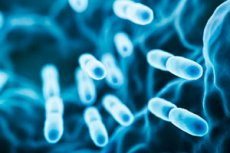
传统化疗通常面临重大挑战,包括严重的副作用、对健康组织的损害以及有限的有效性。
如今,新加坡国立大学杨潞龄医学院(NUS Medicine)的研究人员开发出一种革命性的癌症治疗方法——一种比传统化疗更具针对性、更有效、毒性更低的替代疗法。这种新方法不仅提高了治疗效果,还显著减少了治疗癌症所需的药物剂量。
在副教授 Matthew Chang 的带领下,新加坡国立大学临床与技术创新合成生物学中心 (SynCTI) 和新加坡国立大学医学院合成生物学转化项目 (Syn Bio TRP) 的研究人员发现了一种新的药物输送方法,为开发癌症患者的新型临床治疗方法带来了希望。该研究成果发表在《自然通讯》杂志上,展示了一种利用细菌与癌细胞之间的自然相互作用,将化疗药物直接输送到肿瘤部位的新方法。
前体药物是指利用非活性分子(前体药物)在体内(尤其是在肿瘤环境中)转化为活性药物,利用肿瘤的独特条件(例如低氧或高酸度),直接在癌症部位激活药物,同时最大限度地减少对健康组织的损害。然而,目前的前体药物策略靶向特异性有限,并且通常依赖于大分子载体,这使得药物的分布和消除变得复杂。
为了克服这些局限性,新加坡国立大学医学院的研究人员开发了一种前体药物输送方法,利用一种乳酸杆菌共生菌株,这种菌株能够通过一种名为硫酸乙酰肝素的表面分子特异性地与癌细胞结合。这些转基因细菌携带一种前体药物,该药物在肿瘤部位直接转化为化疗药物SN-38。
在鼻咽癌临床前模型中,转基因细菌直接定位到肿瘤,并在癌症部位直接释放化疗药物,使肿瘤生长减少 67%,化疗药物的有效性提高 54%。
这项研究最有前景的方面之一是其可能广泛应用于各种类型的癌症治疗,因为研究人员发现的乳酸杆菌菌株可以特异性地与癌细胞结合。
首席研究员、SynCTI研究员沈浩生博士表示:“通过利用细菌与癌细胞之间的亲和力,我们的目标是彻底改变化疗的给药方式。我们正在评估多种微生物菌株对不同癌细胞系的结合亲和力,旨在开发一种多功能的给药系统,利用微生物菌株将化疗药物靶向不同的粘膜癌,例如结直肠癌、泌尿系统癌、胃癌、口腔癌、肺癌和鼻癌。”
“癌症治疗对患者来说往往是一场极其艰难的考验。我们的研究代表着我们朝着开发更具针对性、毒性更低的抗癌方法迈出了重要一步。我们希望这能为温和有效的治疗方法铺平道路。” 新加坡国立大学医学院医学系主任、SynCTI 和新加坡国立大学医学院 Syn Bio TRP 主任张副教授补充道。

